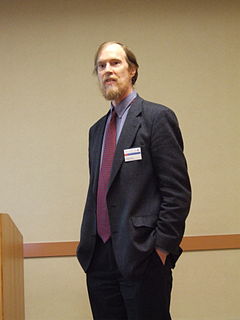The National Institute of Standards and Technology (NIST) is an agency of the United States Department of Commerce whose mission is to promote American innovation and industrial competitiveness. NIST's activities are organized into physical science laboratory programs that include nanoscale science and technology, engineering, information technology, neutron research, material measurement, and physical measurement. From 1901 to 1988, the agency was named the National Bureau of Standards.

Ronald Linn Rivest is a cryptographer and an Institute Professor at MIT. He is a member of MIT's Department of Electrical Engineering and Computer Science (EECS) and a member of MIT's Computer Science and Artificial Intelligence Laboratory (CSAIL). His work has spanned the fields of algorithms and combinatorics, cryptography, machine learning, and election integrity.
The National Institute of Justice (NIJ) is the research, development and evaluation agency of the United States Department of Justice. NIJ, along with the Bureau of Justice Statistics (BJS), Bureau of Justice Assistance (BJA), Office of Juvenile Justice and Delinquency Prevention (OJJDP), Office for Victims of Crime (OVC), and other program offices, comprise the Office of Justice Programs (OJP) branch of the Department of Justice.

David A. Wagner is a professor of computer science at the University of California, Berkeley and a well-known researcher in cryptography and computer security. He is a member of the Election Assistance Commission's Technical Guidelines Development Committee, tasked with assisting the EAC in drafting the Voluntary Voting System Guidelines. He is also a member of the ACCURATE project.
Britain J. Williams III is a Professor Emeritus of computer science at Kennesaw State University in Georgia, and is consultant with the school's Center For Election Systems. He has bachelor's and master's degrees in mathematics from the University of Georgia, and a PhD is in Statistics from the University of Georgia in 1965. He joined the faculty of (then) Kennesaw State College in 1990.

The Election Assistance Commission (EAC) is an independent agency of the United States government created by the Help America Vote Act of 2002 (HAVA). The Commission serves as a national clearinghouse and resource of information regarding election administration. It is charged with administering payments to states and developing guidance to meet HAVA requirements, adopting voluntary voting system guidelines, and accrediting voting system test laboratories and certifying voting equipment. It is also charged with developing and maintaining a national mail voter registration form.

ASTM International, formerly known as American Society for Testing and Materials, is an international standards organization that develops and publishes voluntary consensus technical standards for a wide range of materials, products, systems, and services. Some 12,575 ASTM voluntary consensus standards operate globally. The organization's headquarters is in West Conshohocken, Pennsylvania, about 5 mi (8.0 km) northwest of Philadelphia.

Election Systems & Software (ES&S) is an Omaha, Nebraska-based company that manufactures and sells voting machine equipment and services. The company's offerings include vote tabulators, direct-recording electronic (DRE) machines, voter registration and election management systems, ballot-marking devices, electronic poll books, Ballot on Demand printing services, and absentee voting-by-mail services.

The Federal Information Security Management Act of 2002 is a United States federal law enacted in 2002 as Title III of the E-Government Act of 2002. The act recognized the importance of information security to the economic and national security interests of the United States. The act requires each federal agency to develop, document, and implement an agency-wide program to provide information security for the information and information systems that support the operations and assets of the agency, including those provided or managed by another agency, contractor, or other source.
Various governments require a certification of voting machines.

Arden Lee Bement Jr. is an American engineer and scientist and has served in executive positions in government, industry and academia.

William A. Jeffrey is the CEO of SRI International, a position he has held since September 2014. He is an astronomer and astrophysicist by education.

Douglas W. Jones is an American computer scientist at the University of Iowa. His research focuses primarily on computer security, particularly electronic voting.
The term "software independence" (SI) was coined by Dr. Ron Rivest and NIST researcher John Wack. A software independent voting machine is one whose tabulation record does not rely solely on software. The goal of an SI system is to definitively determine whether all votes were recorded legitimately or in error.
An Independent Testing Authority (ITA) is a laboratory certified by the United States-based National Association of State Election Directors (NASED) to test voting systems to the Voting System Standards (VSS) or the Voluntary Voting System Guidelines (VVSG) in the process of certifying voting systems. The Election Assistance Commission has taken over the responsibility for accrediting such laboratories and now uses the National Institute of Standards and Technology's National Voluntary Laboratory Accreditation Program. Under the EAC process, ITA's are now known as Voting System Testing Laboratories (VSTLs).
The Voluntary Voting System Guidelines (VVSG) are guidelines adopted by the United States Election Assistance Commission (EAC) for the certification of voting systems. The National Institute of Standards and Technology's Technical Guidelines Development Committee (TGDC) drafts the VVSG and gives them to the EAC in draft form for their adoption.
ISO/IEC JTC 1, entitled "Information technology", is a joint technical committee (JTC) of the International Organization for Standardization (ISO) and the International Electrotechnical Commission (IEC). Its purpose is to develop, maintain and promote standards in the fields of information and communications technology (ICT).
Election Markup Language (EML) is an XML-based standard to support end to end management of election processes.
The National Conference on Weights and Measures (NCWM) is a not-for-profit corporation dedicated to developing the United States technical standards for weights and measures in commerce. The organization's official mission is "Ensuring Equity and Uniform Standards in a Changing Marketplace.








